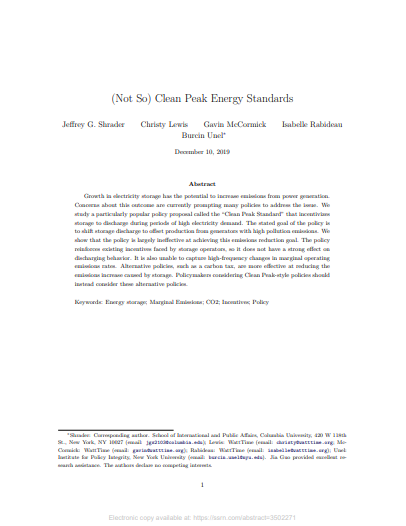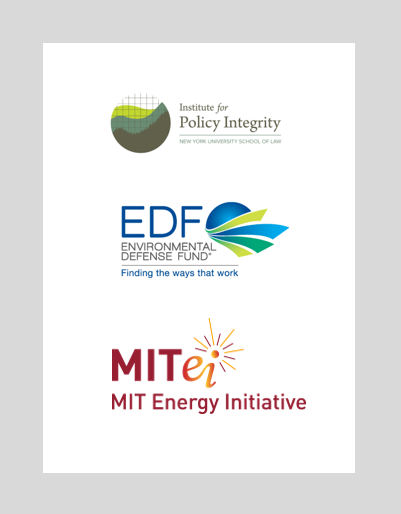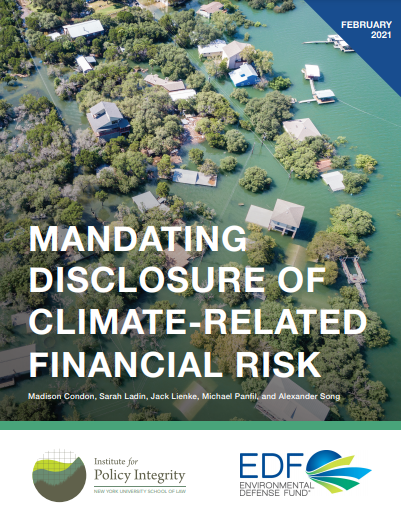-
Comments on New York PSC’s Initial Report on Power Grid Study
The New York Public Service Commission (PSC) requested input on its initial report on the New York Power Grid Study. Our comments recommend steps the PSC can take to not only achieve emissions reduction goals, but also give appropriate priority to environmental justice.
-
(Not So) Clean Peak Energy Standards
Growth in electricity storage has the potential to increase emissions from power generation. Concerns about this outcome are currently prompting many policies to address the issue. We study a particularly popular policy proposal called the “Clean Peak Standard” that incentivizes storage to discharge during periods of high electricity demand. The stated goal of the policy is to shift storage discharge to offset production from generators with high pollution emissions. We show that the policy is largely ineffective at achieving this emissions reduction goal. The policy reinforces existing incentives faced by storage operators, so it does not have a strong effect on discharging behavior. It is also unable to capture high-frequency changes in marginal operating emissions rates. Alternative policies, such as a carbon tax, are more effective at reducing the emissions increase caused by storage. Policymakers considering Clean Peak-style policies should instead consider these alternative policies.
-
Comments to ONRR on Royalty Rates for Oil and Gas Leasing
A new rulemaking by the Office of Natural Resources Revenue (ONRR) delays the effective date of its previously-finalized Valuation Reform and Civil Penalty Rule and seeks input on several questions. We submitted comments focusing primarily on a question about the role of climate impacts in setting royalty policy.
-
Comments to DOE on Future Energy Conservation Rulemakings
The Department of Energy called for input on its prioritization process for energy conservation rulemakings. We submitted comments detailing immediate, mid-term, and long-term actions that DOE can take to more efficiently set energy conservation standards and deliver greater benefits to consumers, public health, and the environment.
-
Retail Electricity Tariff Design, Distributed Energy Resources, and Emissions
In this paper, we use an economics-engineering simulation model to analyze how different types of residential retail tariff designs such as time-of-use, critical-peak pricing, and fully cost-reflective tariffs affect DER deployment and use, and, hence, the resulting emissions of CO2, SO2, and NOx in the Commonwealth Edison service territory in Chicago. Our results show that in the short term retail tariffs can help or hinder environmental goals through their effect on DER deployment and consumption behavior, emphasizing the importance of pairing DER policy initiatives with decarbonization efforts at the wholesale electricity level.
-
The Role of Electricity Tariff Design in Distributed Energy Resource Deployment
This paper simulates the effect of more advanced residential electricity tariffs on household adoption of distributed energy resources (DERs). We find that tariffs that are more time variant lead to greater reductions in coincident peak demands than flat volumetric tariffs, both from load shifting as well as from adoption of DERs. Regarding the effect of electricity tariff design on DER investments, we find that at current DER purchase costs investments in rooftop photovoltaic (PV), batteries and natural gas distributed generators are not privately optimal under any of our tariff design scenarios based on current cost levels for electricity and gas in the Chicago study area.
-
Rate Design and Distributed Energy Resource Integration: Impacts on the Environment and Distribution System Costs
This project looks at the effects of different retail tariff designs on the deployment of distributed energy resource (DERs), and their subsequent effect on pollution, electric system costs, and customer bills. We use smart-meter data and techno-economic models to simulate the effects of more granular and cost-reflective tariff designs on DER investment and use.
This project is supported by the Alfred P. Sloan Foundation, and is a collaboration between the Institute for Policy Integrity, Environmental Defense Fund, and the MIT Energy Initiative.
-
McTeer Toney Gives Testimony on Climate Risk Disclosure in House Committee Hearing
Heather McTeer Toney, Climate Justice Liaison for the Environmental Defense Fund and Senior Advisor to Moms Clean Air Force, testified in a hearing on corporate climate risk held by the House Financial Services Committee. Included with her submitted testimony is our report with the Environmental Defense Fund on how the Securities and Exchange Commission can issue new, mandatory disclosure rules focused on climate risk.
-
Comments on Proposed Environmental Analysis Rule for Army Actions
The Department of the Army proposed a rule that would have the agency quantify the greenhouse gas emissions of significant actions but does not require impacts to be assessed using the social cost of carbon. We submitted comments urging the Army to not adopt the provision. Its environmental analyses should consider monetized climate impacts.
-
Mandating Disclosure of Climate-Related Financial Risk
Climate change presents grave risk across the U.S. economy, including to corporations, their investors, the markets in which they operate, and the American public at large. Unlike other financial risks, however, climate risk is not routinely disclosed to the public. This report, authored by Policy Integrity and the Environmental Defense Fund, urges the Securities and Exchange Commission to issue new, mandatory disclosure rules focused on climate risk.
Viewing recent projects in Climate and Energy Policy






